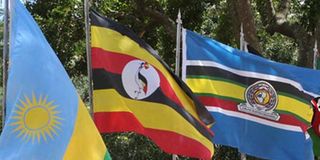EAC experts meet over Juba admission to bloc

A flag of the EAC (C) with other member states raised.
What you need to know:
South Sudan’s capacity to profit from the EAC will depend on its level of investment.
Kampala.
Experts on East African matters will this November discuss whether the Republic of South Sudan should join the East African Community (EAC) or not in Arusha.
South Sudan’s Gross Domestic Product (GDP)—a measure of the economy—according to the World Bank, is estimated at $9.3 billion. The country with a population of 10.8 million largely relies on oil revenues.
The EAC bloc, which brings together five countries that include Kenya, Tanzania, Uganda, Rwanda, and Burundi, boasts of a combined population of 135.4 million people and a GDP of $84.7 billion (about Shs213 trillion).
Experts say South Sudan’s capacity to profit from the EAC will depend on substantial investment in human resources and institutions of governance as well as physical infrastructure. This is because the new nation emerged from decades of war that cost lives of hundreds of people and destruction of property.
The Secretary General of the EAC, Dr Richard Sezibera, in communiqué issued to the Daily Monitor, yesterday said: “The meeting is scheduled from November 7 to 8 in Arusha, to determine its rules of procedure and programme on South Sudan.” This follows a meeting of Council of Ministers held in August, in which it was approved that a proposed process of handling the negotiations with the Republic of South Sudan to join the East African Community be held.
In this meeting, the Ministers recommended that a high level negotiation team be established and that the partner states nominate three members to the team by September 30. The Council of Ministers also directed the Secretariat to convene a meeting thereafter of the negotiation team to start the talks with the Republic of South Sudan.
The negotiation will be designed in three phases; technical negotiations involving experts from the EAC and the Republic of South Sudan. The second phase will involve Permanent Secretaries to while the third phase will be at the Ministerial level.




